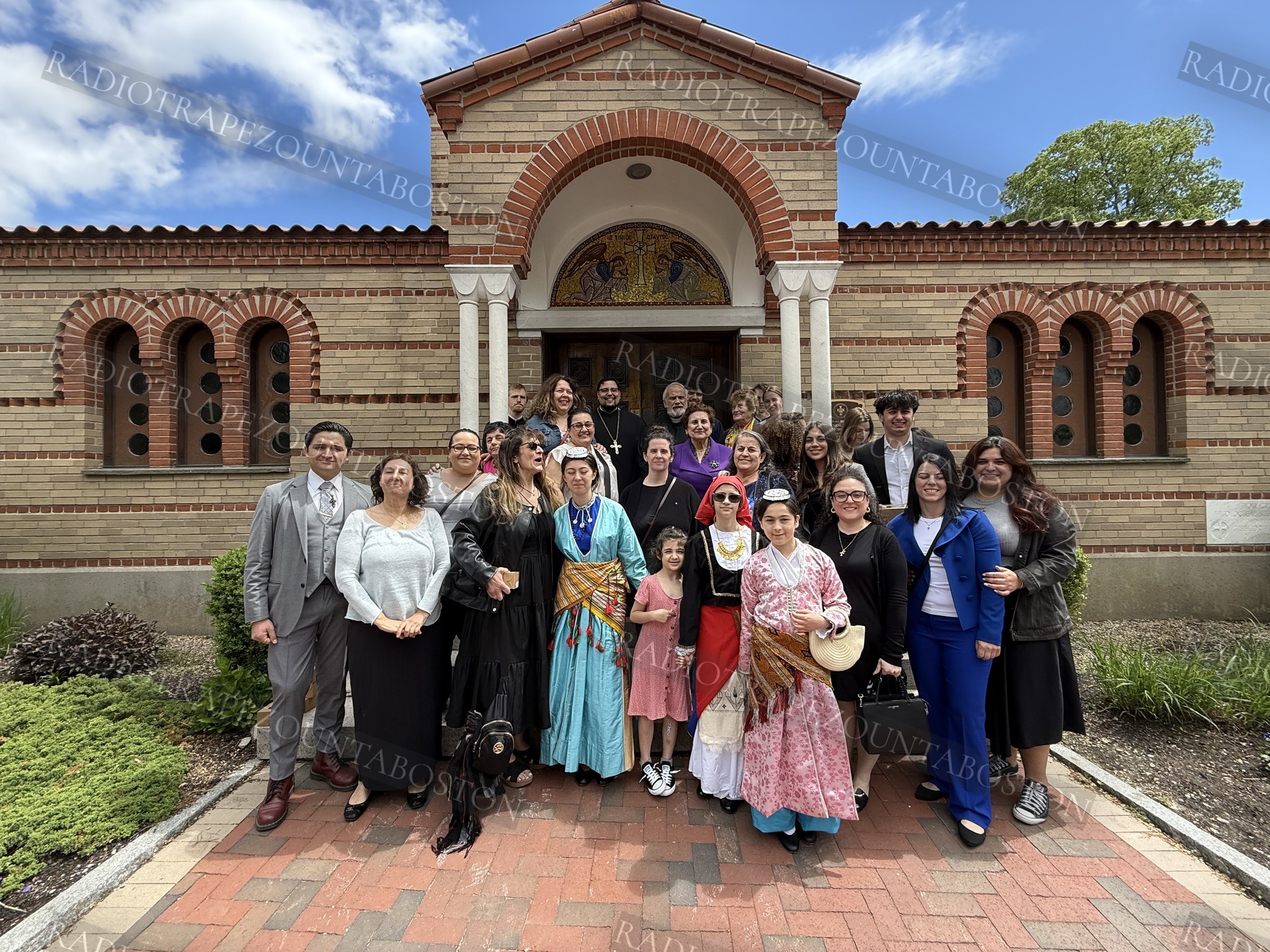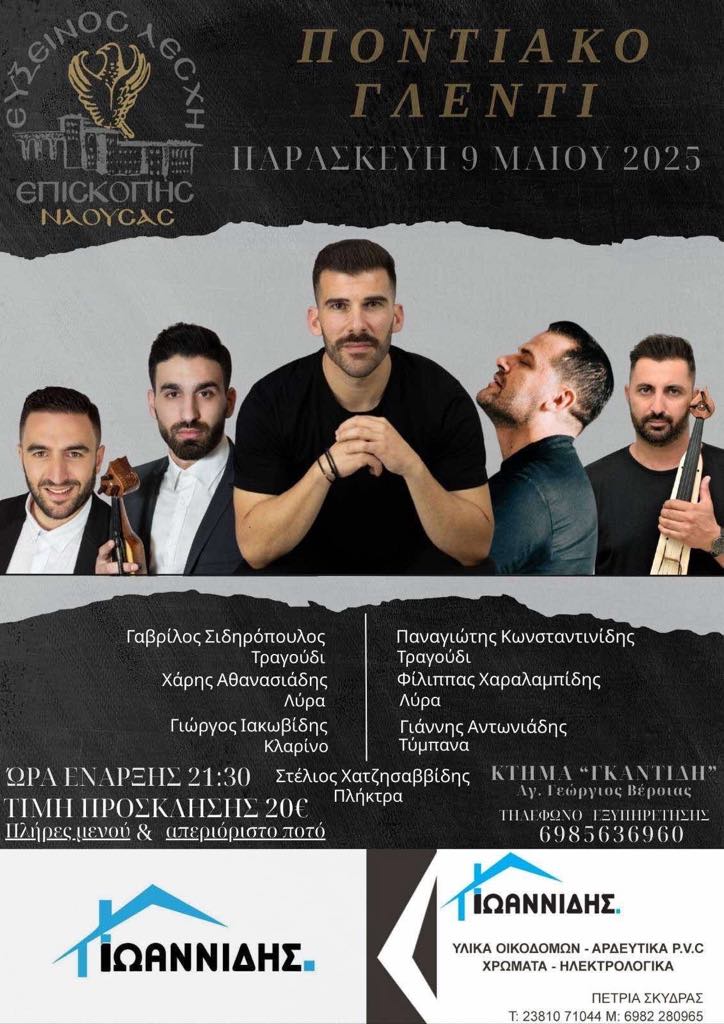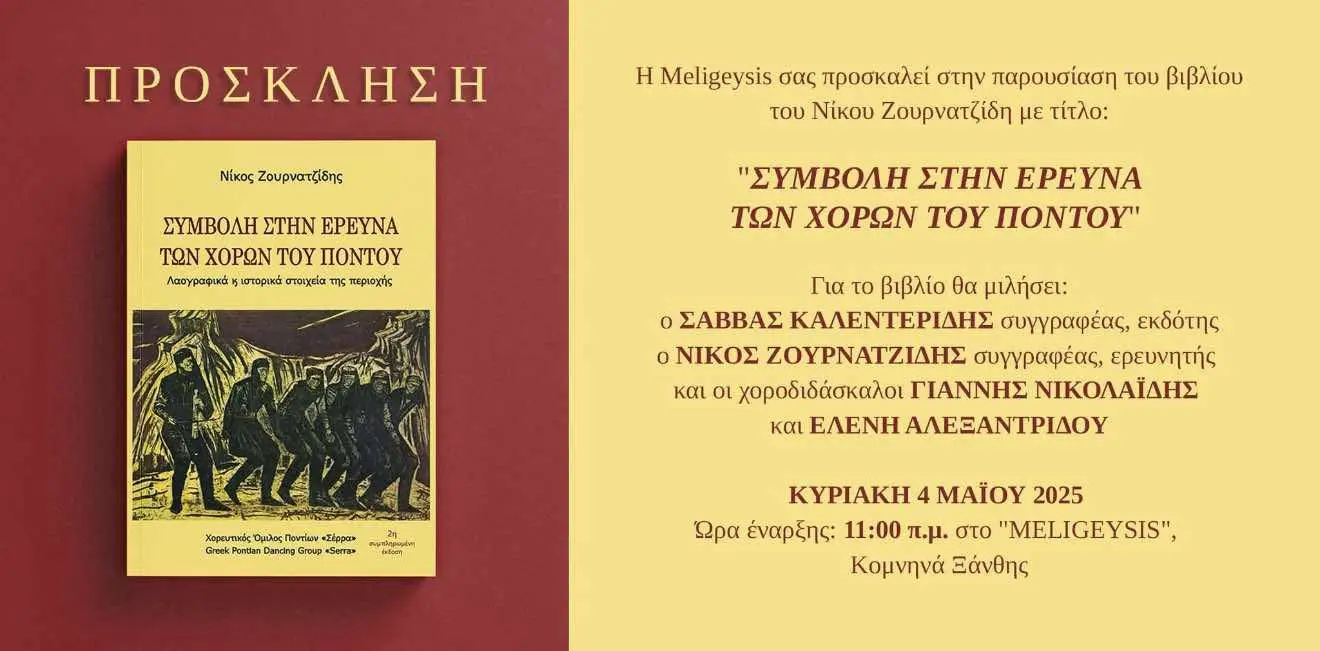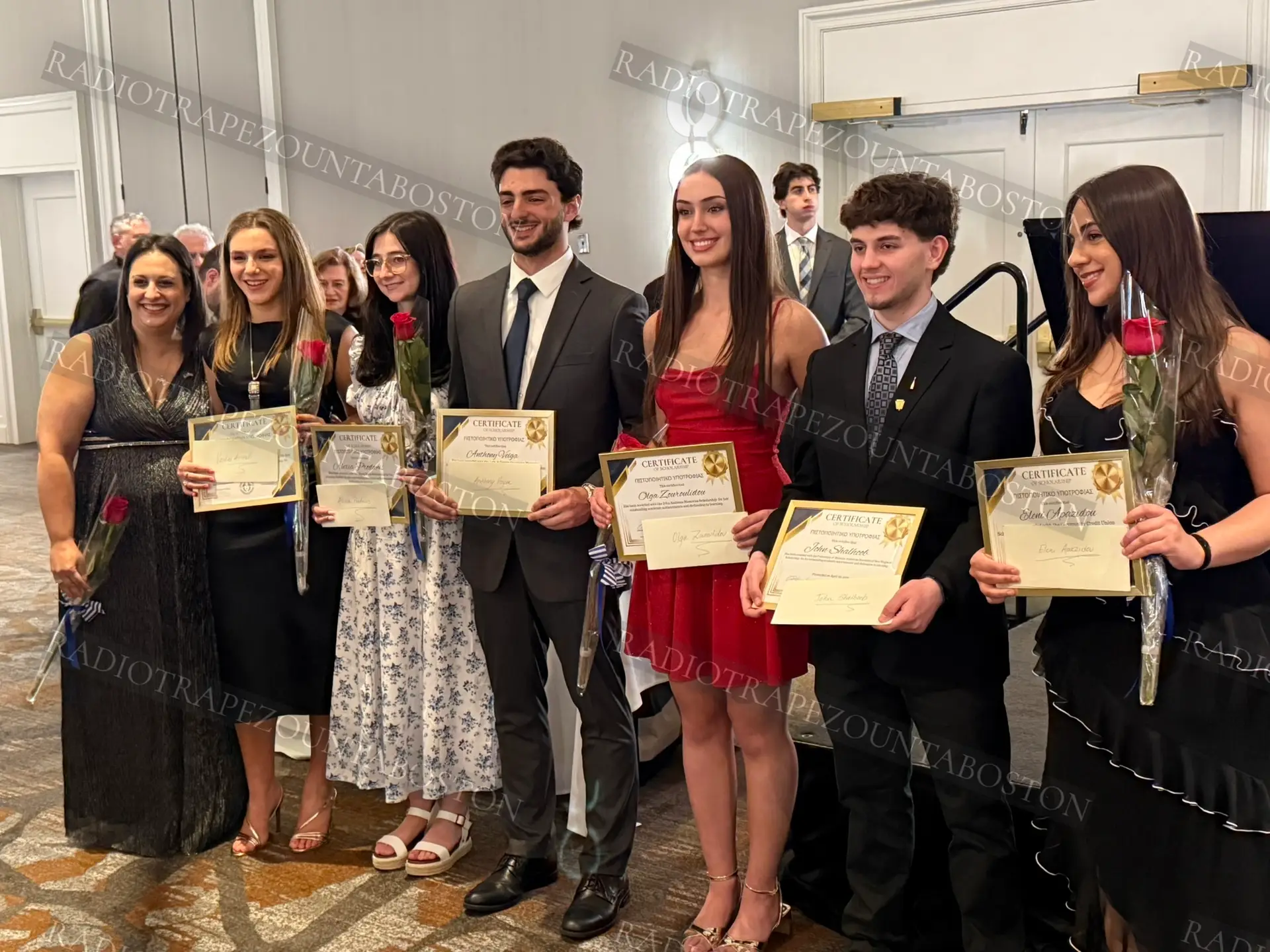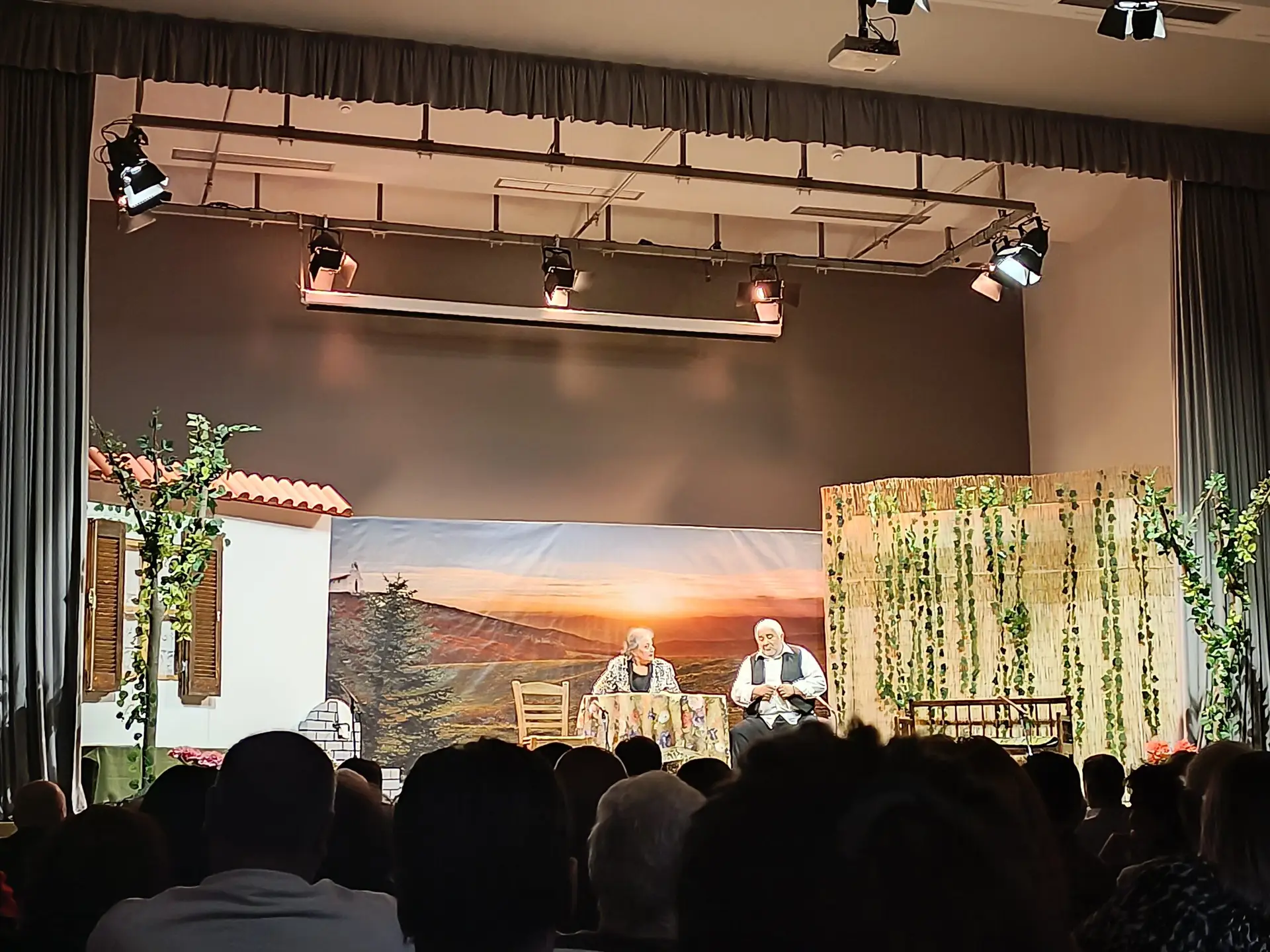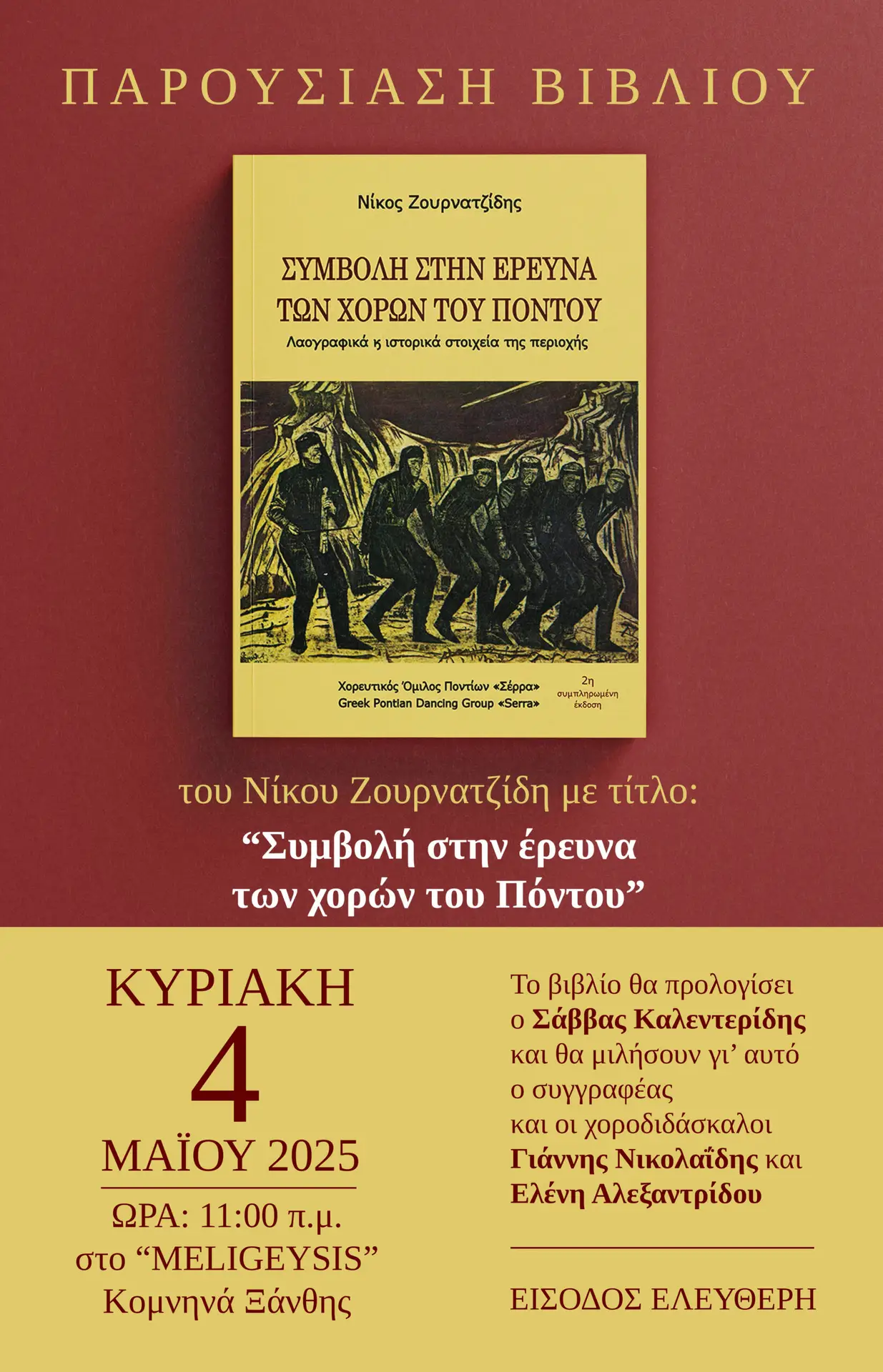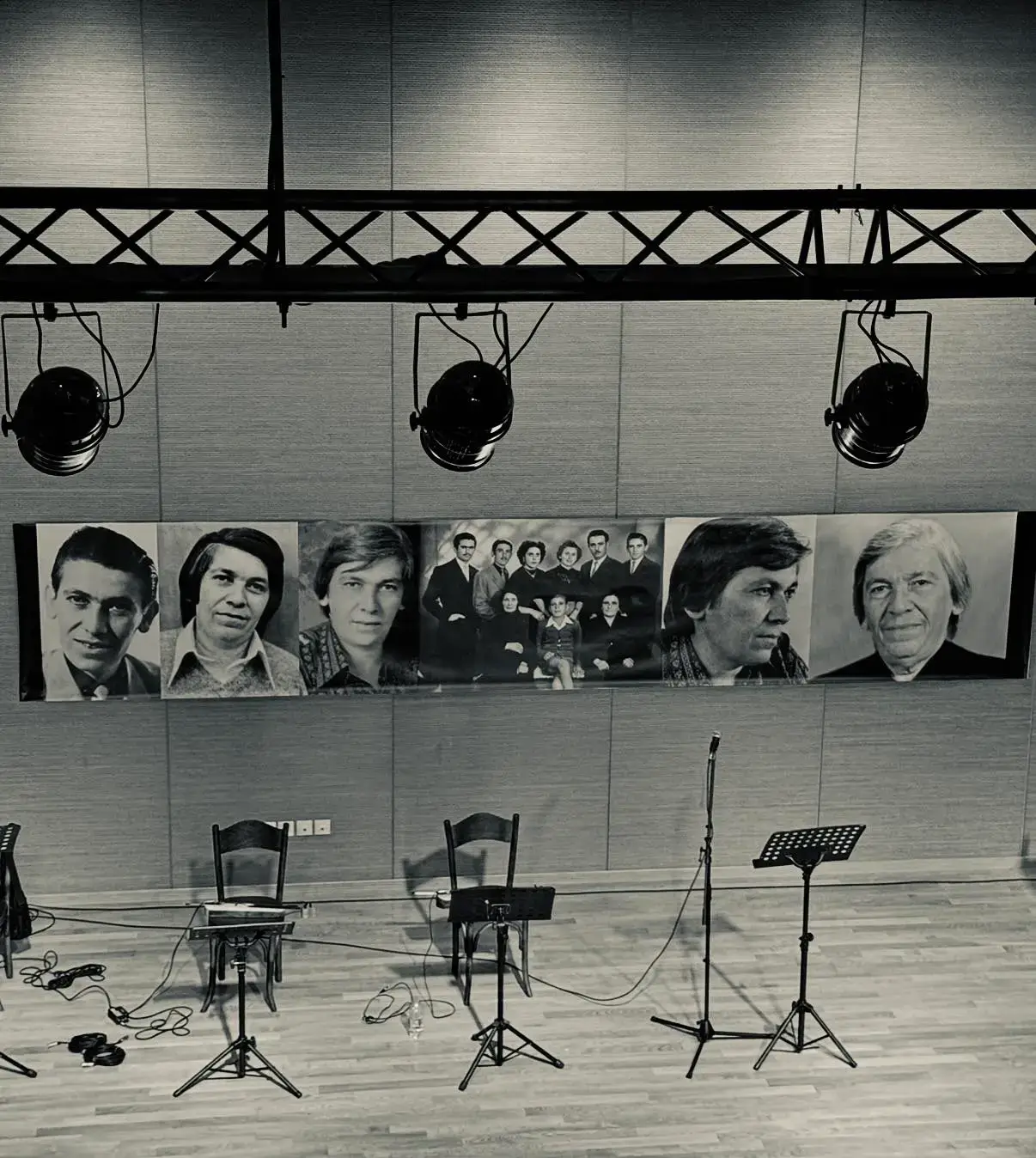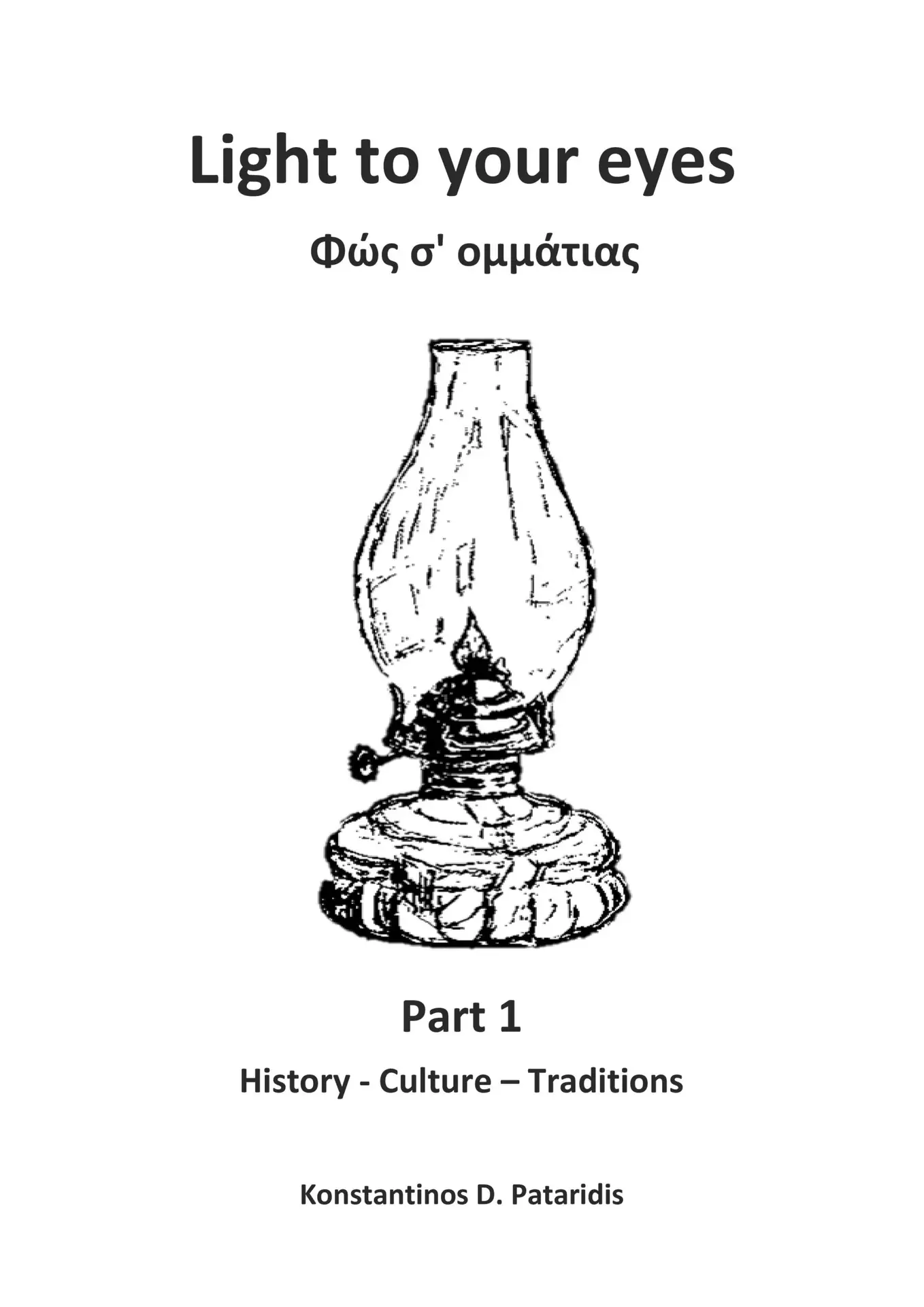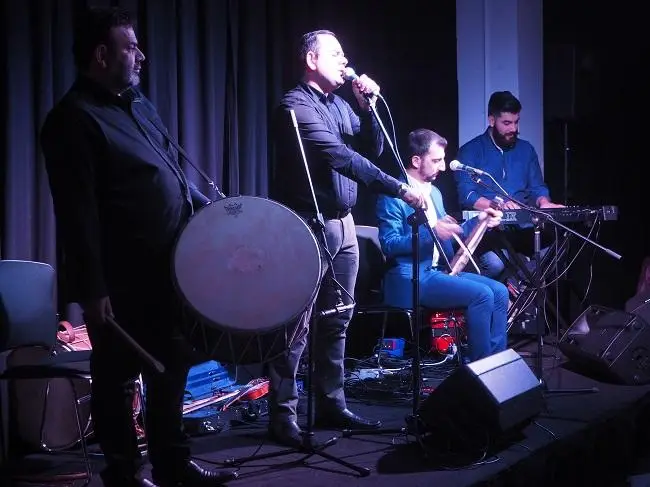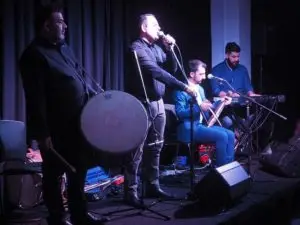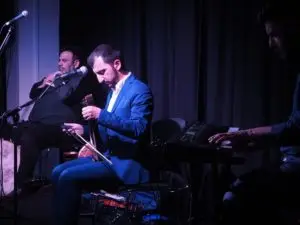Ο ΑΝΤΩΝΗΣ ΠΙΛΑΛΙΔΗΣ ΚΑΙ Ο ΧΡΗΣΤΟΣ ΚΑΛΙΟΝΤΖΙΔΗΣ ΣΤΗΝ ΑΥΣΤΡΑΛΙΑ
20 October 2017
JIM CLAVEN – ΑΠΟΔΟΣΗ: ΖΩΗ ΘΩΜΑΪΔΟΥ
Ταξιδεύοντας στον Πόντο με τη μουσική
Μια μοναδική συναυλία που μετέφερε τη μουσική παράδοση του Πόντου στην Αυστραλία, είχε την ευκαιρία να απολαύσει την περασμένη εβδομάδα το κοινό της Μελβούρνης
Ο Αντώνης Πιλαλίδης στο τραγούδι και ο Χρήστος Καλιοντζίδης στη λύρα, με τη συνοδεία ντόπιων καλλιτεχνών στο Ελληνικό Κέντρο Μελβούρνης, την Παρασκευή, 13 Οκτωβρίου. Φωτογραφία: Jim Claven
Μια μοναδική συναυλία που μετέφερε τη μουσική παράδοση του Πόντου στην Αυστραλία, είχε την ευκαιρία να απολαύσει την περασμένη εβδομάδα το κοινό της Μελβούρνης.
Ο λόγος για την εμφάνιση των Θεσσαλονικιών, Χρήστου Καλιοντζίδη και Αντώνη Πιλαλίδη, στο Ελληνικό Κέντρο, με τη συνοδεία ντόπιων καλλιτεχνών.
Η άφιξή τους στην Αυστραλία έγινε μετά από πρόσκληση της Ποντιακής Εστίας, πιστή στην παράδοσή της να φέρνει τα καλύτερα μουσικά δείγματα του Πόντου στον ελληνισμό της διασποράς.
Οφείλω να ομολογήσω ότι αυτό που με εντυπωσίασε περισσότερο στη συναυλία τους ήταν η τεχνική, ο τρόπος με τον οποίο πέτυχαν την αρμονική αλληλεπίδραση μεταξύ του τραγουδιού και των οργάνων, ιδιαίτερα της ποντιακής λύρας και των κρουστών.
Το μουσικό μας ταξίδι ξεκίνησε με τη λύρα του Χρήστου, με τη μελωδική φωνή του Αντώνη σαν φυσικό επακόλουθο να περιγράφει την περιοχή της Μαύρης Θάλασσας, το ορεινό της τοπίο και τις ιστορίες αγάπης και απώλειας που έχουν καταγραφεί σε αυτήν ανά τα χρόνια.
Λίγες ημέρες μετά τη συναυλία, είχα την τύχη να γνωρίσω από κοντά και να συνομιλήσω με το καλλιτεχνικό δίδυμο.
Μπορεί να έχουν γεννηθεί στη Θεσσαλονίκη, όμως η ιστορία του Χρήστου και του Αντώνη συνδέεται με αυτήν της διασποράς του Πόντου και της Μικράς Ασίας, με τις οικογένειές τους να έχουν ξεριζωθεί από τις πατρίδες τους κατά την Μικρασιατική Καταστροφή, αναζητώντας νέο τόπο εγκατάστασης σε πόλεις και χωριά της Μακεδονίας.
Η οικογένεια του Αντώνη από τη μεριά της μητέρας έχει καταγωγή από τα περίχωρα της Σμύρνης, ενώ και οι δύο συνδέονται μέσω των προγόνων τους με την Τραπεζούντα
Ακούγοντας τις ιστορίες τους, είναι ολοφάνερο πως η μουσική αποτελεί σημαντικό κομμάτι της ταυτότητάς τους. Ο Αντώνης τραγουδά εδώ και χρόνια, ενώ για τον Χρήστο το “μικρόβιο” της μουσικής είναι… υπόθεση οικογενειακή! Ο παππούς του ήταν ψάλτης στην εκκλησία του χωριού του και ο πατέρας του επίσης μουσικός.
Το συμπέρασμά μου επιβεβαιώνουν και οι ίδιοι, λέγοντας μάλιστα ότι η μουσική συνιστά συνδετικό κρίκο με την μακρινή πατρίδα του Πόντου. Τα λόγια των τραγουδιών, τους μεταφέρουν στη γη των προγόνων τους. Δεν είναι, άλλωστε, τυχαίο το γεγονός ότι η μουσική έπαιξε σημαντικό ρόλο στο να διατηρηθεί ζωντανή η ποντιακή διάλεκτος.
Αυτή η σύνδεση έρχεται έμπρακτα στην επιφάνεια όταν τους ρωτώ για το αγαπημένο τους τραγούδι. Μου αναφέρουν και οι δυο τον παραδοσιακό βουκολικό σκοπό ‘μακρύν καϊτέ’ που μεταφράζεται ως μεγάλη μελωδία. Έρχεται από το χωριό Ματσούκα, στην καρδιά του Πόντου μεταξύ Τραπεζούντας και Αργυρούπολης, και η ιστορία αναφέρει πως χρησιμοποιούνταν από τους βοσκούς καλώντας ο ένας τον άλλον, τις ημέρες που περνούσαν στα βουνά φυλάγοντας ζώα.
Το ορεινό τοπίο έχει κεντρική θέση στην οικογενειακή ιστορία του Χρήστου. Από τα στόματα των διωκόμενων προγόνων του έφτασαν στα αυτιά του μαρτυρίες, όπως αυτές των γυναικών του Πόντου που περνούσαν ώρες ατελείωτες δουλεύοντας στα βουνά, αρμέγοντας τις αγελάδες, προετοιμάζοντας το φαγητό για τον χειμώνα. Ήταν αυτές που διατηρούσαν ενωμένη την κοινότητα.
Ο Χρήστος μου μιλά ακόμη για το ιστορικό παρελθόν της περιοχής και την εγκατάσταση πληθυσμών στα παράλια της Μαύρης Θάλασσας φτάνοντας μέχρι και τη γη της σημερινής Γεωργίας.
Η μουσική του Πόντου αντικατοπτρίζει την γεωμορφολογική ποικιλότητα και την πλούσια πολιτισμική κληρονομιά της περιοχής. Ενδεικτικό είναι ότι μουσικολόγοι έχουν εντοπίσει στοιχεία της ποντιακής μουσικής που προέρχονται από την περσική παράδοση και πράγματι ο Χρήστος μου αναφέρει ως παράδειγμα τις ομοιότητες στο σχήμα της ποντιακής λύρας και την τεχνική που χρησιμοποιείται για το παίξιμό της.
Εξαιρετικό ενδιαφέρον παρουσιάζει αναμφίβολα η ποντιακή διάλεκτος. Τόσο πλούσια και ζωντανή, με ρίζες στα αρχαία ελληνικά και επιρροές που μαρτυρούν τους δεσμούς με τις γύρω περιοχές, για πολλούς αποτελεί πρόκληση να την κατανοήσουν ή πόσο μάλλον να τη μάθουν.
Σύμφωνα με τον Χρήστο, ο μόνος τρόπος να τη μάθει κανείς είναι μέσω του τραγουδιού.
Όπως συμβαίνει με πολλά είδη παραδοσιακής ελληνικής μουσικής, η ποντιακή μουσική, αλλά και η κουλτούρα γενικότερα έχει επιβιώσει χάρη στην αφοσίωση των ανθρώπων, οι οποίοι και αντιστάθηκαν στις όποιες προσπάθειες επιβολής πολιτιστικής ομοιογένειας, που μάταια επιχείρησαν να καταπνίξουν τις διαφορετικές συνεισφορές που συνθέτουν την ελληνική κουλτούρα και παράδοση.
Το ίδιο επισημαίνει και ο ιστορικός Neal Ascherson γράφοντας για τη διατήρηση της ποντιακής κουλτούρας, από την ιστορική περιοχή του Πόντου, της Κωσταντινούπολης και της Ρωσίας έως τη σημερινή Ελλάδα και διασπορά ανά τον κόσμο, ως μια ιστορία επιβίωσης παρά τις αντιξοότητες.
Γι’ αυτό και οι δύο μουσικοί, Χρήστος και Αντώνης, δηλώνουν χωρίς δεύτερη σκέψη τη στήριξή τους στο έργο της Επιτροπής Μνήμης George Treloar, τιμώντας έναν άνθρωπο που βοήθησε σημαντικά στη μετεγκατάσταση των προσφύγων της Μικράς Ασίας στον ελλαδικό χώρο.
Ο Χρήστος Καλιοντζίδης μαγεύει τους θαμώνες με τις μελωδίες της ποντιακής λύρας. Φωτογραφία: Jim Claven
“Οφείλουμε να διατηρήσουμε ζωντανή στη μνήμη των Ελλήνων και των Αυστραλών αυτή την ιστορία ανθρωπιάς που συνδέει τις δύο χώρες. Άνθρωποι σαν τον George Treloar διαδραμάτισαν καθοριστικό ρόλο για την επιβίωση του μοναδικού πολιτισμού των Μικρασιατών, συμπεριλαμβανομένων αυτών του Πόντου. Είμαστε όλοι εξαιρετικά ευγνώμονες για αυτό”, λέει χαρακτηριστικά ο Χρήστος.
Είναι τιμή μου που γνώρισα τους δύο νεαρούς μουσικούς, που άκουσα τις ιστορίες τους, που μοιράστηκαν μαζί μου τις πηγές έμπνευσής τους. Πρόκειται για καλλιτέχνες που φέρνουν το δικό τους μοναδικό ταμπεραμέντο στη μουσική παράδοση του Πόντου. Συστήνω ανεπιφύλακτα σε όποιον ενδιαφέρεται για τα διαφορετικά είδη της ελληνικής μουσικής παράδοσης να ακούσει τις δημιουργίες του Χρήστου και του Αντώνη.
*O Jim Claven είναι ιστορικός, συγγραφέας και μέλος της Επιτροπής Μνήμης George Treloar. Ιδιαίτερες ευχαριστίες στους Λίτσα και Σάκη Αθανασιάδη που τον έφεραν σε επαφή με τον Χρήστο Καλιοντζίδη και τον Αντώνη Πιλαλίδη. Ο πιο πρόσφατος δίσκος του Χρήστου φέρει τον τίτλο ‘Ση Χαλκόβας τα στράτας’ και διατίθεται προς πώληση στην Ποντιακή Εστία Μελβούρνης. Για αγορά του δίσκου επικοινωνήστε με τη Λίτσα Αθανασιάδη στη διεύθυνση litsa007@hotmail.com
Originally posted here: http://neoskosmos.com/news/el/node/63141
Dreams of Pontus
Following their performance at the Greek Centre, Jim Claven goes one-on-one with Thessaloniki’s Christos Kaliontzidis and Andonis Pilalidis about Pontian music
20 October 2017
JIM CLAVEN
Last week Melbourne’s iconic Greek Centre was moved by the performance of two young exponents of the music of Pontus. Assisted by local musicians, Thessaloniki’s Christos Kaliontzidis and Andonis Pilalidis brought their sensitive and soulful rendition of some of the Hellenic world’s most moving songs.
Christos and Andonis were brought to Australia by Melbourne’s Pontiaki Estia, which has a long tradition of bringing the best of Pontian music to the Australian diaspora. After sell-out performances at the Estia on Sydney Road, Christos and Andonis delivered an amazing final concert before a devoted crowd at the Greek Centre’s intimate mezzanine performance space.
Christos and Andonis were brought to Australia by Melbourne’s Pontiaki Estia, which has a long tradition of bringing the best of Pontian music to the Australian diaspora. After sell-out performances at the Estia on Sydney Road, Christos and Andonis delivered an amazing final concert before a devoted crowd at the Greek Centre’s intimate mezzanine performance space.
What impressed me most was the subtlety of their performance. The balance of the music really brought out the essential harmony between the melodic singing and their various instruments, especially the Pontian lyra and drums. As Christos’ lyra began our musical journey, Andonis’ soft voice told us of a land of mountains and snow, of the great Black Sea, of love and loss.
A few days later it was my great honour to meet and interview Christos and Andonis, sitting outside in the warm spring sunshine in Melbourne’s Fitzroy.
Both hail from Thessaloniki, but their story is of the Pontian and broader Asia Minor diaspora. They have roots in the villages surrounding the ancient Greek city of Trebizond, and Andonis’ mothers’ family comes from the village of Meteveli in the region surrounding Smyrne. Torn from their ancestral homelands by the Asia Minor catastrophe, their families made their way to the towns and villages of Macedonia, to Thessaloniki, Veria, and Kavala.
As they tell me their stories it is clear that music is a strong part of their identity. Andonis has been singing for many years, while Christos’ musical roots stretch back to his grandfather who sang as the chanter in the village church of Kosma in the hinterland surrounding Trebizond. Christos first came to Australia in 2014, accompanying his father Mihalis – also a musician.
Both hail from Thessaloniki, but their story is of the Pontian and broader Asia Minor diaspora. They have roots in the villages surrounding the ancient Greek city of Trebizond, and Andonis’ mothers’ family comes from the village of Meteveli in the region surrounding Smyrne. Torn from their ancestral homelands by the Asia Minor catastrophe, their families made their way to the towns and villages of Macedonia, to Thessaloniki, Veria, and Kavala.
As they tell me their stories it is clear that music is a strong part of their identity. Andonis has been singing for many years, while Christos’ musical roots stretch back to his grandfather who sang as the chanter in the village church of Kosma in the hinterland surrounding Trebizond. Christos first came to Australia in 2014, accompanying his father Mihalis – also a musician.
He nods in agreement as Andonis tells me that for him their music is an essential part of their identity and in performing they are connecting to their Pontic motherland. The songs they sing are more than words, they move them emotionally to the land of their forebears and indeed music has played a major role in keeping alive the ancient Pontian language. Christos tells me that his father told him that he could only play Pontian music if he first sang in Pontian.
This connection is clear when I ask them to name their favourite song – both reply with the same, which in English is called The Long Song. From the village of Matsoukas, it is an ancient song that shepherds recited as they called out to each other, waiting out the long days in the mountains guarding their flocks. They call out in long tones, singing the names of their fellow shepherds and friends as the snow falls.
These mountains feature in Christos’ family story, learnt from the mouths of the exiles as they talked of Pontus amongst themselves in the villages of northern Greece. They spoke of how women of the villages of Pontus would spend long hard months on end, working alone in the mountains, milking cows and preparing the food for winter. And they were proud of their work; it is the women that held the community together.
Christos talks of the rich heritage of Pontus, stretching back to before the Dorian invasion of mainland Greece and the expulsion of the original settlers in the 9th century BCE. They would take to the sea, their voyage taking them through the Dardanelles and into the great expanse that is the Black Sea and would settle across its shores, some following in the wake of Jason and the Argonauts to the land now known as Georgia. And so too one of the songs from Christos’ latest CD and written by Adonis calls out to the Black Sea, Mavro Thalassa.
Others settled on the northern shores of Anatolia, spreading into the hinterland and formed the Pontian nation. The region is a crossroads, connecting the regions of the Black Sea by ship and to far away Persia by land. The music of Pontus reflects this cultural richness. Musicologists find elements of Pontian music drawn from Persia, and indeed Christos tells me that the shape of the Pontian lyra and the style in which it is played is closer to that region than any other.
For many Hellenes, the Pontian language is a mystery. It is a demotic, direct and living language, owing much to the language of the great classical playwrights, especially Aristophanes. With its roots in Ancient Greek and with many other influences reflecting the region and its links, Christos tells me that the only true way to learn the Pontian language is through song.
Like much Hellenic folk music until recently its history was one of repression. Insecure national government’s sought to impose a cultural uniformity, seeking to blot out the beautiful cultural threads that make up the tapestry that is Hellenic culture.
The survival of Pontian music, language, and culture stands as a testimony to the devotion of their community. As the historian Neal Ascherson has written in his history of the Black Sea, the maintenance of Pontian culture – from Pontus, through Constantinople and Russia, to Greece and across the diaspora – is an amazing story of cultural survival against terrific odds. That’s why Christos and Andonis have taken time to share their experience with local musicians. It’s no surprise they are both so proud of the fact that Thessaloniki’s great Aristotle University has recently established courses in Pontian culture.
Both are also very supportive of the work of Melbourne’s George Treloar Memorial Committee to erect a major new memorial in Ballarat in honour of George Treloar and his work assisting Christian refugees from Asia Minor. Christos has performed in Thrylorion, one of the former refugee villages established with George Treloar’s help in the 1920s.
“We need to remind both the people of Greece and Australia of this great humanitarian story, linking both countries. Helpers like George Treloar played a key role in the survival of the unique culture of the peoples of Asia Minor, including those from Pontus. We all owe him a debt of gratitude,” Christos said.
I feel honoured to have met these young musicians, to have listened to their stories and their inspirations. I encourage all interested in the diversity of Hellenic music to make the effort to listen to Christos and Andonis’ creations, you won’t be disappointed.
* Jim Claven is a trained historian and freelance writer. He is a member of the George Treloar Memorial Committee and thanks both Litsa and Saki Athanasiadis for introducing him to both Christos Kaliontzidis and Andonis Pilalidis. Christos’ latest CD ‘Ση Χάλκοβας τα Στράτας’ is available from Melbourne’s Pontiaki Estia. To purchase a copy, email litsa007@hotmail.com
Original English version posted here: http://neoskosmos.com/news/en/Dreams-of-Pontus
Ακούστε ένα τραγούδι από το CD του Χρήστου Καλιοντζίδη “Ση Χάλκοβας τα Στράτας” με τίτλο “Θάλασσα Μαυροθάλασσα”
Στίχοι: Αντώνης Πηλαλίδης Μουσική: Χρήστος Καλιοντζίδης
Listen to a song from Christos Kaliontzidis’ CD “Si Halkovas Ta Stratas” titled “Thalassa Mavrothalassa” (Sea, Black Sea)
Lyrics: Antonis Pilalidis
Music: Christos Kaliontzidis

